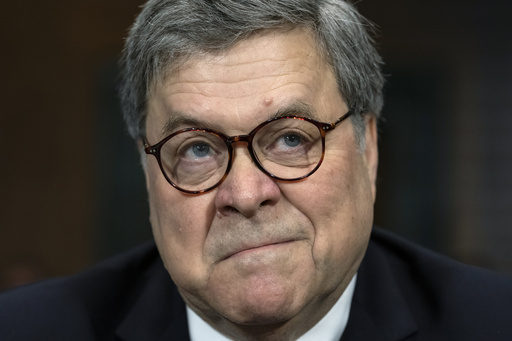WASHINGTON (AP) — China is fueling the fentanyl crisis in the U.S. by directly subsidizing the manufacturing of materials that are used by traffickers to make the drug outside the country, according to a report released Tuesday by a special House committee focused on countering the Chinese government.
Committee investigators said they accessed a government website that revealed tax rebates for the production of specific fentanyl precursors as well as other synthetic drugs as long as those companies sell them outside of China.
“Through its actions, as our report has revealed, the Chinese Communist Party is telling us that it wants more fentanyl entering our country,” said Rep. Mike Gallagher, the Republican chairman of the special House committee. “It wants the chaos and devastation that has resulted from the epidemic.”
In November, President Joe Biden and Chinese President Xi Jinping announced a resumption of bilateral cooperation on counternarcotics with a focus on reducing the flow of precursor chemicals and synthetic drug trafficking. But the congressional report raises questions about whether China is following through.
The report’s findings were released Tuesday as part of a hearing examining China’s role in the fentanyl epidemic in the U.S. Most overdose deaths in the U.S. continue to be linked to fentanyl and other synthetic opioids. Inexpensive fentanyl is increasingly cut into other drugs, often without the buyers’ knowledge.
The Chinese government not only subsidizes the manufacturing of precursor chemicals, but the report says it has also thwarted investigations into illicit manufacturers by warning the targets of an investigation when U.S. law enforcement has sent a formal request for assistance. Investigators said multiple current and former federal agents have described the notification of targets, leading those targets to revamp operations and make it harder to detect their activities.
Former U.S. Attorney General William Barr told lawmakers in Tuesday’s hearing that it’s hard to believe that a country with the most pervasive surveillance system in the world is not fully aware of the massive drug trafficking taking place. He said the committee’s report “uncovered persuasive evidence” that China’s government is not just a bystander, but is “knee deep” in sponsoring and facilitating the export of fentanyl precursors.
Barr recommended the U.S. use its trade and economic power to seek greater enforcement from Chinese authorities. He also said victims should bring civil actions against companies and individuals involved in distributing the precursors and synthetic drugs.
“I don’t think we can count on their goodwill, as we have in the past,” Barr said.
A Chinese official in a statement didn’t directly address the allegation of China subsidizing the production of fentanyl precursors, but the official did list several steps the nation has taken to curb fentanyl production.
Following the Biden-Xi meeting in November, China issued a notice to remind relevant enterprises and individuals to be cautious in the sale of substances used for producing narcotic drugs. And on Jan. 30, a China-U.S. counter-narcotics working group officially launched, said Liu Pengyu, a spokesperson for the Chinese embassy in Washington.
China has also pushed forward with a campaign that has involved “severely cracking down on illegal activities involving smuggling, manufacturing, trafficking and abuse of fentanyl substances and their precursor chemicals,” Pengyu said. And drug control authorities from the two countries are in regular communication with the Chinese updating U.S. officials on progress related to law enforcement actions and responding to requests for verification.
“All these fully show that China’s drug control authorities have taken active actions to implement the consensus reached by the two Presidents, fully demonstrating China’s sincerity,” Pengyu said in a written statement. “It is very clear that there is no fentanyl problem in China, and the fentanyl crisis in the United States is not caused by the Chinese side, and blindly blaming China cannot solve the US’ own problem.”
Rep. Raja Krishnamoorthi, the top Democrat on the committee, said Chinese companies are also currently selling synthetic opioids on their websites, and pointed to a screenshot of one such solicitation that committee staff found just Monday night in advance of the hearing. He said such posts have to be taken down immediately.
“There are hundreds of these website posts — hundreds” Krishnamoorthi said. “This is completely unacceptable.”
The chemical companies providing fentanyl precursors often have legitimate businesses with customers around the world. The report said fentanyl precursors and other synthetic narcotics are a “side hustle” designed to maximize profits.
Businesses that deal in fentanyl precursors and narcotics on the side are particularly vulnerable to U.S sanctions. The same goes for companies such as banks, online platforms and shipping companies that enable illicit fentanyl trade.
The report calls on Congress to clarify the power of the president to sanction those involved in drug trafficking, for the U.S. to impose financial sanctions on violators and for regular reports to Congress on how often sanctions have been undertaken.
It also calls for forming a task force that would place intelligence, economic and enforcement resources under one roof. The head of the group would report directly to the attorney general of the U.S. and serve as a special assistant to the president on the National Security Council with authority over the opioids portfolio.
This website uses cookies so that we can provide you with the best user experience possible. Cookie information is stored in your browser and performs functions such as recognising you when you return to our website and helping our team to understand which sections of the website you find most interesting and useful.
